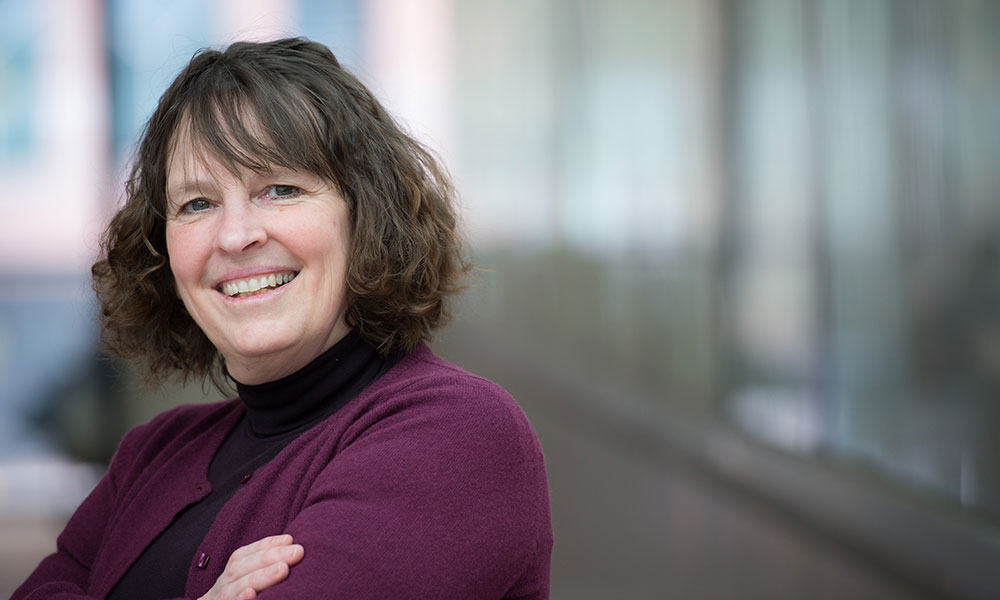Faculty Profile, People
Who is minding the children? We all should be, according to Social Work researcher and professor Judy Gillespie
November 16, 2017

About
Name
Judy Gillespie
Role
Associate Professor
Program
Social Work
Faculty
Health and Social Development
Campus
Okanagan (Kelowna, BC)
Education
PhD, UBC’s School of Community and Regional Planning (2006)
MSW, University of Calgary (Faculty of Social Work, 1992)
Hometown
Grande Prairie, Alta.
“My hope is that the research we are doing will translate into changes in child welfare policy and practice across Canada and internationally.”
CANADIAN CHILDREN ARE PROTECTED by their parents, the community that surrounds them, and by government-run Children’s Aids, Child and Family Services, and other formal authorities.
Usually, these parties are aligned. But sometimes, there are major disconnects—and children are the ones who suffer most.
The sentiment that “it takes a community” to raise a child resonates quite deeply with researcher Judy Gillespie, associate professor at UBC Okanagan’s School of Social Work.
With decades of experience advocating for children in large and small cities, she strongly believes that communities have a significant role in developing and supporting child welfare policies and practices.
Gillespie can recall challenging situations where she has been the mediator between families whose belief system is at odds with that of the courts. Canada now has strong legislature on corporal punishment, children in the labour force, and children’s right to health care.
Gillespie views these issues as dynamic and requiring dialogue between parents, communities and the law—something she has dedicated her research career to define.
DEFINING COMMUNITY
Gillespie’s research was inspired by her parents’ sense of family and community, which treasured children, she says.
“But I learned early that this is not always the case. That’s why I was drawn to a career of social work.”
That, and a strong family tenet that career choices should be practical.
Following completion of her undergraduate training in social work, Gillespie opted to gain hands-on experience and entered a research-based master’s program. Here, she was exposed to some hard-luck child cases and became dedicated to improving their situation. After eight years working for government-led child welfare, Gillespie was discouraged by the seemingly never-ending caseload and repetitive approach to care.
In search of a new perspective, Gillespie entered a graduate program in urban studies.
“My close-knit family background and my experience in child protection triggered the idea that not enough community engagement is incorporated into child welfare practices,” she says.
“I needed to better understand what defines a community, and how communities are engaged in child welfare—and my urban planning research provided me with this.”
THE COMMUNAL APPROACH
Community continues to be at the heart of Gillespie’s work, so much so that she’s established one with her research team, which incorporates a multi-player communal approach: Students are encouraged to think beyond their specific backgrounds and toward collaboration between other professions.
For example, Gillespie suggests that teachers, doctors, nurses, social workers and parents all need to communicate and develop a cohesive strategy together. While interprofessional social work practices are taught elsewhere, UBC is taking the lead in developing this practicing outlook in Canada.
UBC’s Okanagan campus features its own Interprofessional Clinic, which provides students with real-world experiences while helping those in need within the community. Clinic staff come from the School of Social Work in the Faculty of Health and Social Development, in cooperation with the department of Psychology in the Irving K. Barber School of Arts and Sciences.
“My hope is that the research we are doing will translate into changes in child welfare policy and practice across Canada, and internationally in countries such as Australia which struggle with many of the same challenges,” Gillespie says. “We, in particular, need to be more appreciative and sensitive to how various communities approach the well-being of a child.”
In her experience, this varies from community to community, based on geography, demographics and ethnic makeup. She asserts that our institutional systems need to be respectful and aware of the community they are supporting.
A case in point: the issues surrounding children from Aboriginal communities.
“We need to listen to the concerns from the community,” Gillespie says. “Canada’s Aboriginal groups are advocating for themselves and addressing their needs, including child welfare. Their perspectives need to be acknowledged and incorporated into future strategies.”
Gillespie has been at UBC Okanagan since its inception more than a decade ago. She has seen the university grow both physically and by student population.
“There are tremendous research opportunities for students who come here to complete their master’s degree in Social Work,” she says.
“Our campus supports and encourages interprofessional networking and collaborations as the way forward for social work practice.”
Students are the raison d’être of our campus, Gillespie says. With purpose, they are paving the path to improved care for one of the most vulnerable populations: Children, from all communities.